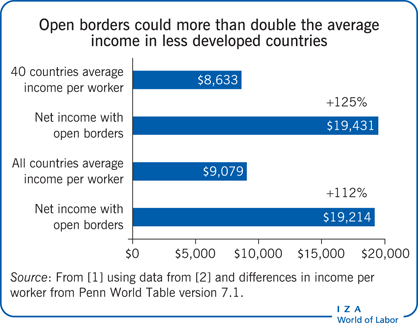Elevator pitch
Most developed countries have foreign aid programs that aim to alleviate poverty and foster economic growth in less developed countries, but with very limited success. A large body of evidence indicates that the root of the economic development problem is cross-country differences in the productivity of labor. If workers are much more productive in one country than in another, the obvious way to help people in less developed countries is to allow them to help themselves by moving to places where they can be more productive. Yet immigration laws severely constrain such movement.
Key findings
Pros
Immigrants can greatly improve their standard of living, even after allowing for the costs of living away from home.
If workers are much more productive in one country than in another, lifting the restrictions on immigration would produce large efficiency gains.
The estimated net gains from open borders are about the same as the gains from a growth miracle that more than doubles incomes in less-developed countries.
Cons
Immigrants are a burden on the social welfare system.
Immigrants “are not like us”—a loss of national identity is associated with large inflows of immigrants.
